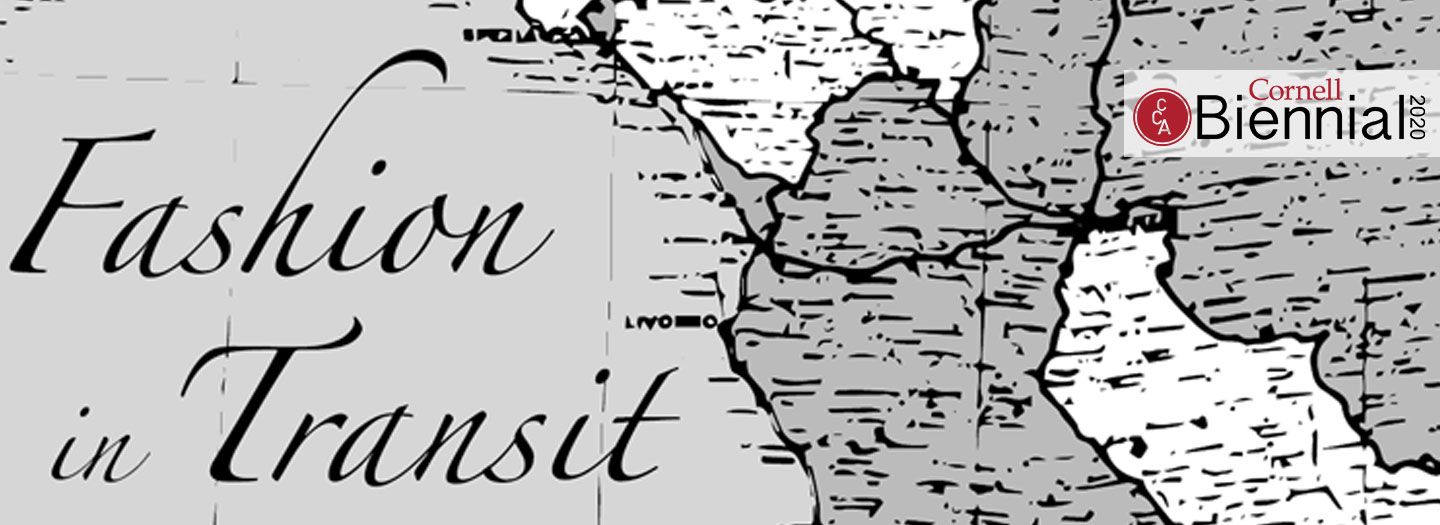
DENISE GREEN
Fashion in Transit
From the aesthetics of transportation mechanisms themselves to the clothing and accessories worn by bodies in motion, fashion affects and is affected by the transit swarm. At a basic level, clothing functions as a form of transportation: shoes for walking, wingsuits for flying, soft robotic exoskeletons that facilitate particular movements for people living with disabilities, among others.
Modes of transportation have also impacted dress and brought about new fashion items, like dusters for early car travel, aviator scarves for pilots, athletic wear for running, skiing, swimming, hiking, and transit workers’ uniforms publicly. Modes of transportation have influenced trends more broadly: many fashion historians, for example, credit the bicycle with transforming women’s fashion from long, heavy, full skirts in the 19th century to the adoption of bifurcated trousers in the 20th century. Last but certainly not least, the ability to obtain clothing and textiles is reliant upon transportation infrastructure, which shapes distribution networks for the apparel supply chain and global, transnational fashion flows.
Fashion in Transit is a collaboration between the Cornell Fashion + Textile Collection, the Cornell Program in Infrastructure Policy, the Society for the Humanities, the Kheel Center for Labor-Management and Documentation Archives, Cornell Tech, and the Herbert F. Johnson Museum of Art. This exhibition is funded by the Cornell Council for the Arts (CCA) as part of the 2020-21 Biennial.
The CCA’s Biennial theme is “Swarm,” and we interpret this concept through the interplay between fashion and transportation. The swarm of fashioned human bodies across, around, above, and through physical space takes many forms: on foot, horseback, sled, wheelchair, boat, railway, car, bus, subway, airplane, spacecraft, and many more. We have chosen to thematically organize the exhibition through verbs; ‘sliding,’ ‘walking,’ ‘swimming,’ ‘orbiting,’ ‘riding,’ ‘rolling,’ ‘flying,’ and ‘visualizing transit.’ This digital exhibition is “in transit” and will shift and change in conversation with a physical installation that will open in March 2021.
- July - October 2020
- Herbert F. Johnson Museum
Annex Lobby - Tuesday - Sunday, 10a-5p
Denise Green (US)
Denise Nicole Green is an Associate Professor in the Department of Fiber Science and Apparel Design and Director of the Cornell Fashion + Textile Collection (CF+TC). Professor Green’s research uses ethnography, video production, archival methods, and curatorial practice to explore production of fashion, textiles, identities, and visual design. She is also a faculty member in American Indian and Indigenous Studies Program, the Cornell Institute of Archaeology and Material Studies, and the American Studies Program, as well as a graduate field member in the Department of Anthropology at Cornell.
Professor Green received a PhD in Socio-Cultural Anthropology from the University of British Columbia. With the Ethnographic Film Unit at UBC and Nuu-chah-nulth First Nations communities, she directed a series of documentary films exploring textiles, identity, and Aboriginal title. She has continued this work, and recently directed the film, Mapping Regalia in Hupacasath Territory, which debuted at the Textile Society of America’s Biennial Conference Film Festival. Prior to her work on the Northwest Coast, Professor Green earned a Master of Science in Textiles from the University of California–Davis where she researched fashion and gender expression at the Burning Man Festival. During her undergraduate program at Cornell University she studied fashioned youth subcultures and completed an honors thesis about redesigning 4-H clothing club curriculum for the 21st century.
In her curatorial practice, Professor Green uses fashion to engage with important social, cultural, and political issues. Most recently, she curated Fashion & Feathers (2019 – 2020) in collaboration with colleagues at the Cornell University Museum of Vertebrates and the Lab of Ornithology. Professor Green’s award-winning exhibitions include The Biggest Little Fashion City: Ithaca and Silent Film Style (2016, recipient of the Richard Martin Award) and Union-Made: Fashioning America in the 20th Century (2017, recipient of the Betty Kirke Excellence in Research Award). She was the faculty advisor for WOMEN EMPOWERED: Fashions from the Frontline (2018), which received international media attention and was part of the Cornell Council for the Arts 2018 Biennial. Professor Green also serves as the faculty advisor for the Charlotte A. Jirousek Research Fellowship in the CF+TC and mentors students curating historical fashion exhibitions. Curatorial, research, and public outreach aspects of the CF+TC are chronicled on social media, including a Facebook, Instagram (@cornellfashioncollection), and the CF+TC blog.
An award-winning documentary filmmaker, Professor Green runs a media production lab in the Human Ecology Building. Her most recent film, Mapping Regalia in Hupacasath Territory (2018) was shown at the Textile Society of America’s juried film festival. Previous films include Histakshitl Ts’awaatskwii – We Come from One Root (2010, recipient of the Jean Rouch Award for Ethnographic Filmmaking and Best Documentary at the Cowichan Aboriginal Film Festival), Mamuu – To Weave/To Work (2013), Somewhere in Between (2009, recipient of Best Documentary award at the UC Davis Student Film Festival), Fifty-Fifty (2009), and Wash and Reuse: Textiles in the Hospital Setting (2009, funded by the National Science Foundation). Professor Green’s graduate students are also active filmmakers, and recent films include #NATURALDYE (2017, directed by Kelsie Doty) and Dedicada a Margarita (2016, directed by Amanda Denham).
In addition to ethnographic, curatorial, and documentary work, Professor Green also engages in creative design practice. In 2015, she founded the Cornell Natural Dye Garden and accompanying Natural Dye Studio, and since then has focused her textile and garment design around the production and use of natural dyes. She, along with her students, have collaborated with fashion companies Wool & Prince and Sies Marjan to create naturally-dyed collections. Professor Green’s innovative work in natural dyes, particularly around athleticwear applications, was recently covered in Women’s Wear Daily.
Professor Green’s research, creative design scholarship, and teaching focus on social and cultural aspects of fashion and textiles.